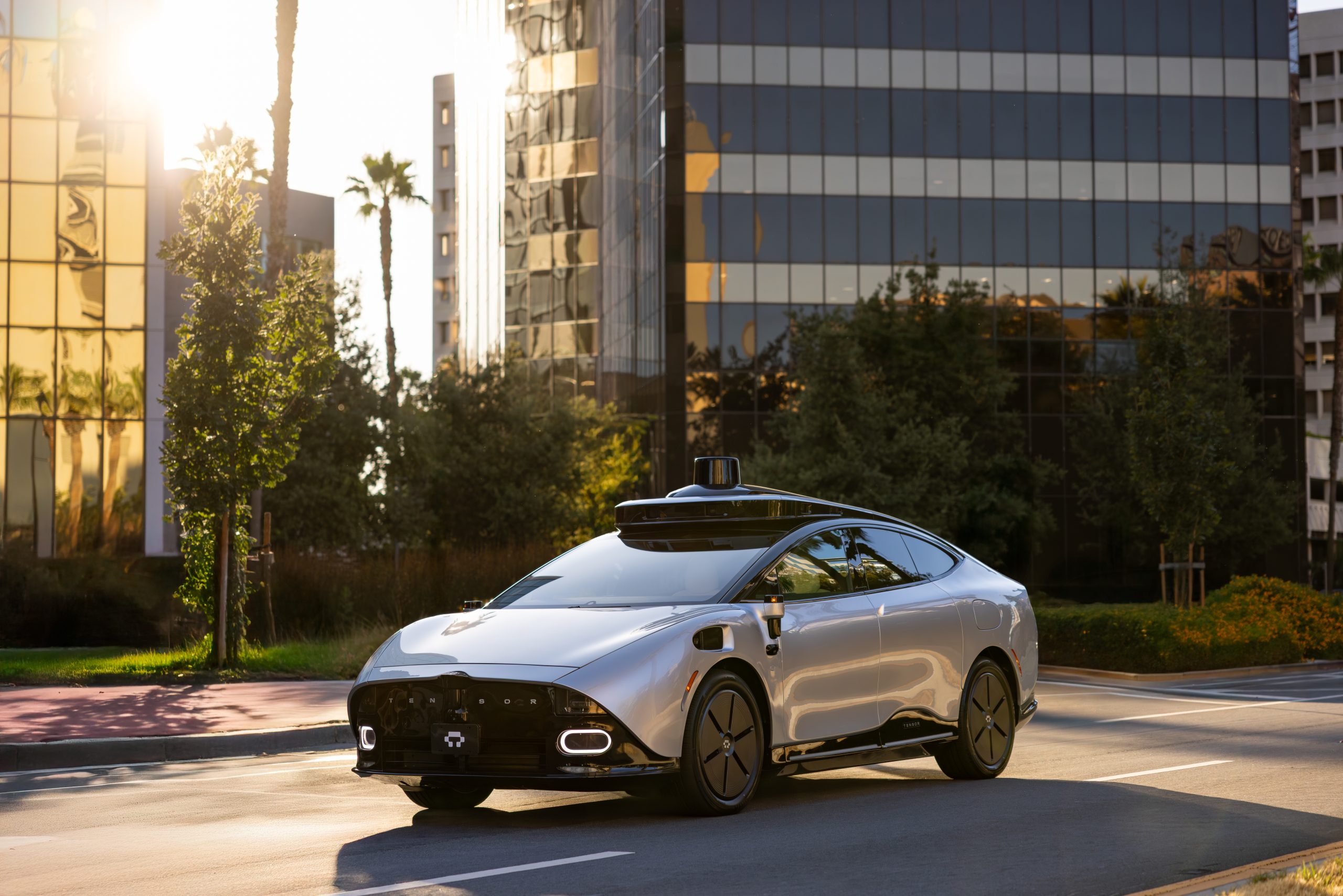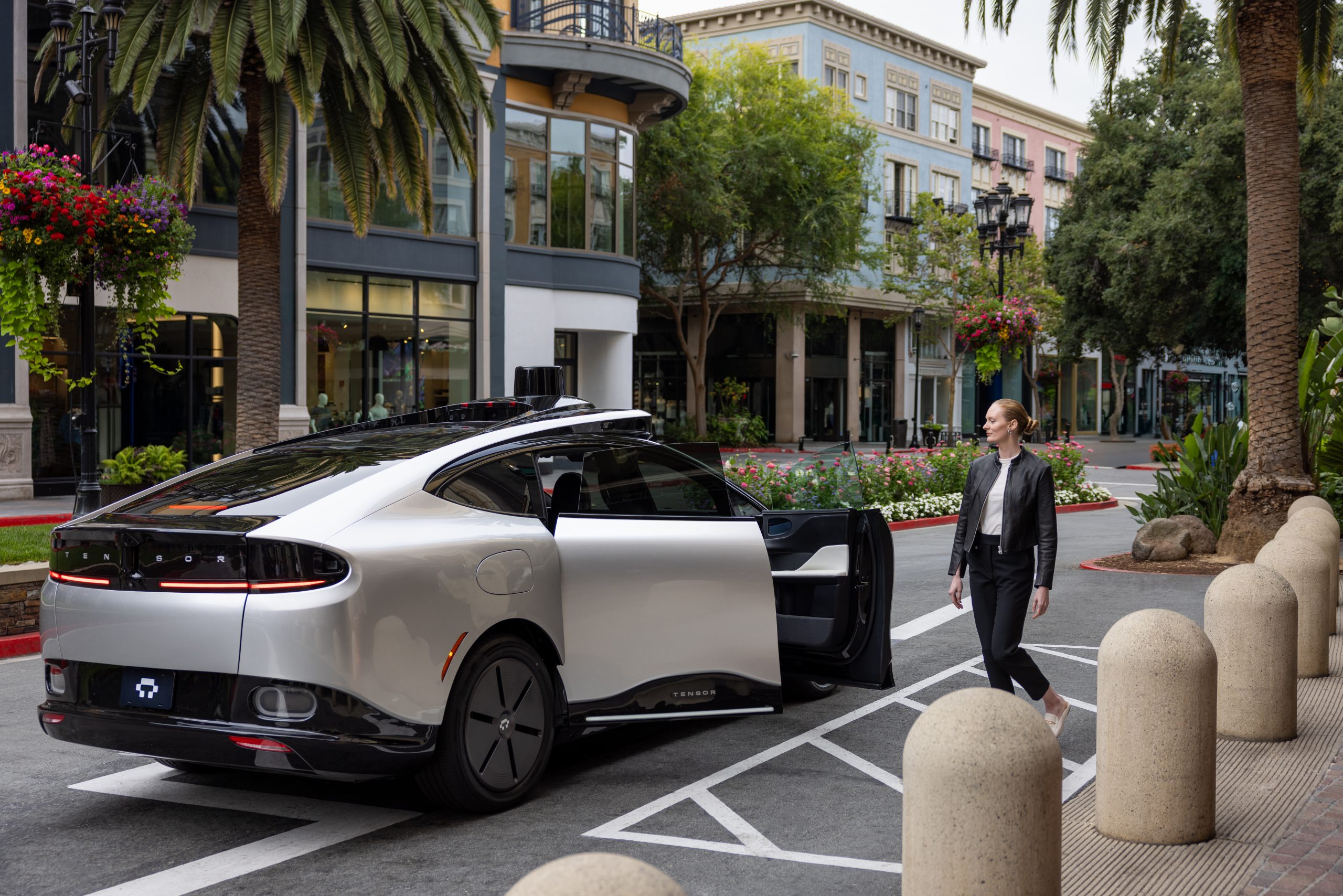Tensor emerges as the world’s first company to design and market a Level 4 autonomous vehicle specifically for private ownership. Unlike the robotaxi-focused approach that has dominated the industry, Tensor’s philosophy centers on “Own Your Autonomy,” a vision where individuals possess their own Artificial General Intelligence (AGI) agents rather than relying on fleet-based services.

The company’s core mission extends beyond traditional automotive boundaries, positioning the Tensor Robocar as an embodied personal AGI that empowers owners with time, freedom, and autonomy.
This approach challenges the prevailing industry assumption that autonomous vehicles must operate as shared fleet assets to achieve economic viability.
Tensor’s origins trace back to AutoX, founded in August 2016 by Jianxiong Xiao, a former MIT PhD and Princeton University assistant professor known professionally as “Professor X”.
Xiao established AutoX in Silicon Valley with the goal of democratizing autonomous driving technology, making it affordable and accessible to everyone rather than limited to premium services.
AutoX initially operated as a robotaxi company, achieving significant milestones in both the United States and China. The company became California’s second recipient of a driverless testing permit and later obtained the second CPUC permit for public robotaxi testing.
During the COVID-19 pandemic lockdowns in the US, AutoX launched a fully driverless robotaxi fleet in China, operating across multiple cities including Shenzhen, Shanghai, Guangzhou, and Beijing.
At its peak, AutoX operated over 1,000 Level 4 autonomous robotaxis across China, representing one of the largest fully driverless fleets globally. The company established a substantial manufacturing facility near Shanghai and maintained operations centers across 65 square miles of Shenzhen.
However, in a strategic pivot that reflects broader industry trends, AutoX has fully discontinued all operations in China as of several years ago. According to Tensor spokesperson Lena Allen, “all operations under the AutoX brand in China have been divested, with all offices closed and operations shut down”.
This strategic withdrawal from the Chinese market allowed the company to refocus entirely on personal autonomous vehicles under the Tensor brand.
The transformation from AutoX to Tensor represents more than a rebranding. It signifies a philosophical shift from fleet-based services to individual ownership. While AutoX focused on democratizing access through shared robotaxi services, Tensor advances this mission by enabling direct personal ownership of autonomous technology.

The Tensor Robocar distinguishes itself through comprehensive sensor redundancy and purpose-built autonomous architecture.
The vehicle incorporates over 100 strategically placed sensors, including 37 high-definition cameras, 5 custom LiDAR units, 11 radar sensors, 22 microphones, ultrasonic sensors, collision detectors, and water sensors.
This sensor array provides 360-degree coverage with multiple redundant systems to ensure continued operation even if individual components fail.
Unlike retrofitted vehicles that add autonomous capabilities to existing platforms, Tensor designed the Robocar from the ground up for autonomy.
Every contour and surface element optimizes sensor placement and performance, eliminating blind spots and ensuring unobstructed sensor operation. The design maximizes sensor visibility while minimizing occlusions that could compromise autonomous functionality.
The vehicle’s advanced electrical and electronic architecture (EEA) incorporates multiple layers of redundancy across power, communications, and control systems.
This includes resettable e-fuses instead of traditional fuses, allowing automatic power restoration after resolving overload conditions. The system enables the vehicle to continue autonomous operation even without onboard passengers, a critical capability for personal ownership scenarios.
Tensor’s interior reimagines vehicle cabin space optimized for autonomous operation.
The centerpiece innovation is the world’s first mass-produced foldable steering wheel, developed in partnership with Autoliv, ZF, and Veoneer.
In autonomous mode, the steering wheel retracts completely within seconds, creating six additional inches of space for passenger comfort.
Complementing the foldable steering wheel, Tensor introduces the world’s first foldable pedals through its partnership with Batz.
During autonomous operation, both accelerator and brake pedals retract into hidden positions, dramatically expanding cabin floor space. When manual driving resumes, the pedals automatically redeploy for normal operation.
The sliding center display system works in conjunction with these retractable controls to create an entirely open cabin environment during autonomous mode. This design enables three distinct “big bed” configurations, allowing the cabin to function as a mobile living space, office, or entertainment center.
At the core of Tensor’s autonomous capabilities lies a sophisticated AI computing system delivering approximately 8,000 TOPS (trillion operations per second) of processing power through 10 GPUs and 144 computing cores.
This computing architecture supports Tensor’s proprietary “Foundation Model,” which combines reflexive decision-making capabilities with advanced Visual Language Model reasoning.
The AI system processes data from all sensor inputs locally within the vehicle, ensuring complete privacy and independence from cloud connectivity.
This approach allows the vehicle to operate autonomously even in areas with limited or no cellular coverage, addressing a limitation of many competing systems that rely heavily on real-time cloud processing.
Tensor’s AI incorporates multimodal large language model (LLM) capabilities embedded within an agentic framework that continuously processes data from in-cabin cameras, microphones, and other sensors.
This system enables advanced reasoning, decision-making, and tool use that extends beyond traditional autonomous driving functions.
Tensor has partnered with VinFast, the Vietnamese automotive manufacturer, for production of the Robocar. VinFast’s Hai Phong manufacturing facility will handle vehicle assembly, while Tensor maintains control over the autonomous system integration and software development.
The production timeline targets delivery beginning in the second half of 2026 for select markets in the United States, Europe, and the UAE.
This timeline positions Tensor among the first companies to deliver consumer-ready Level 4 autonomous vehicles for private ownership.
Initial market focus will concentrate on premium luxury segments, with expected pricing exceeding existing luxury electric vehicles.
Industry analysts suggest pricing could reach approximately $200,000, reflecting the vehicle’s extensive sensor suite and advanced autonomous capabilities.

Tensor’s commitment to safety extends beyond regulatory compliance to encompass comprehensive redundancy across all critical systems.
The vehicle meets FMVSS, IIHS Top Safety Pick+, and US NCAP 5-Star standards, while also complying with European and GCC safety requirements.
The drive-by-wire system achieves a 10 FIT rate (10 failures per billion device hours), making it 10 to 30 times more reliable than conventional vehicles, which typically exceed 300 FIT rates.
This reliability standard proves essential for unsupervised autonomous operation where immediate human intervention may not be available.
Tensor’s 12-airbag matrix includes the world’s first driver-side instrument panel airbag designed specifically for foldable steering wheel configurations. This innovation ensures comprehensive occupant protection even when traditional driver controls are retracted during autonomous operation.
The Tensor Robocar incorporates 845V high-voltage architecture supporting 5C fast charging capabilities, enabling 20% to 80% charge in approximately 10 minutes.
The 112 kWh battery system provides extended range while supporting the substantial power requirements of the autonomous sensor suite and computing systems.
The company’s sensor-redundant architecture and privacy-focused design also address key consumer concerns about autonomous vehicles.
Environmental efficiency extends beyond the powertrain through aerodynamic optimization achieving a 0.253 drag coefficient. This performance level is particularly impressive for an SUV-sized vehicle equipped with extensive external sensors that typically compromise aerodynamic efficiency.
The vehicle’s Active Grille Shutter system adjusts from 0° to 90° to reduce aerodynamic drag by 10%, adding up to 11 miles of range during WLTP testing.
The Multi-Heat-Source Coupled Heat Pump System recycles waste heat from the supercomputer and sensors to improve winter driving range by over 20%.

Tensor marked a significant milestone in its public emergence by participating in The Quail, A Motorsports Gathering during Monterey Car Week 2025. This prestigious automotive event provided Tensor with a platform to showcase the Robocar to an exclusive audience of automotive enthusiasts, collectors, and industry leaders.
The Quail appearance represents Tensor’s strategic entry into the luxury automotive market, positioning the Robocar alongside the world’s most exclusive and innovative vehicles.
Monterey Car Week attendance signals the company’s confidence in its technology readiness and market positioning as it approaches the 2026 delivery timeline.
Tensor operates as an independent American company headquartered in San Jose, California. The company maintains satellite offices in Barcelona, Spain; Dubai, UAE; and Singapore, reflecting its global market ambitions.
This international presence supports Tensor’s planned market entry across the United States, European Union, and Gulf Cooperation Council (GCC) regions.
The company’s operational structure emphasizes privacy and user control. Tensor’s systems operate independently of manufacturer oversight once delivered, with owners maintaining complete control over their vehicle’s data and operational parameters.
This privacy-focused approach differentiates Tensor from competitors who maintain ongoing data collection and operational oversight.
Tensor’s business model centers on direct sales to consumers rather than fleet operations or subscription services.
This approach reflects the company’s commitment to individual ownership and represents a departure from the prevailing industry focus on mobility-as-a-service models.
As a private company, Tensor is not required to file comprehensive financial statements with the SEC.
The company’s funding structure appears to include significant investment from international sources, with spokesperson statements indicating “significant majority investment/ownership from the UK, Japan, Korea and US”.
Tensor’s approach challenges the autonomous vehicle industry’s prevailing assumptions. While competitors including Tesla, Waymo, Cruise, and others have focused primarily on either advanced driver assistance systems or fleet-based robotaxi services, Tensor uniquely targets the personal ownership market with full Level 4 capabilities.
This positioning addresses several market gaps. Traditional automotive manufacturers have struggled to deliver true Level 4 autonomy for consumer vehicles, while technology companies have concentrated on fleet operations that require ongoing operational oversight.
Tensor’s solution bridges these approaches by delivering fleet-grade autonomy in a consumer-ready package.
Through local processing and eliminating manufacturer oversight, Tensor appeals to privacy-conscious consumers while providing the technical reliability necessary for unsupervised operation.
By focusing on individual ownership rather than fleet services, the company addresses consumer desires for personal mobility while delivering advanced autonomous capabilities. As the industry continues to evolve toward greater automation, Tensor’s vision of personal AGI ownership may prove influential in shaping the future of transportation.
Article Last Updated: August 26, 2025.


